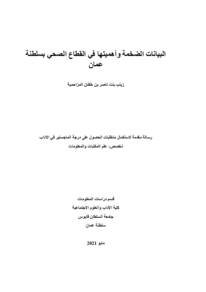Document
البيانات الضخمة وأهميتها في القطاع الصحي بسلطنة عمان.
Other titles
Big Data and its importance in health sector in the Sultanate of Oman
Publisher
جامعة السلطان قابوس.
Gregorian
2021
Language
Arabic
English abstract
The purpose of this study is to identify the major sources generating big data in
health sector in the Sultanate of Oman, to find out how significant is this data and in
what fields it can be invested, as well as its role in managing Covid-19 crises.
Moreover, the study points out the legalizations and laws followed in using big data
in health sector and identifying the major challenges facing users in getting real
values out of this data. The study relies on the qualitative descriptive approach.
Semi-structured personal interview is used in collecting data,(18) interviews were
conducted. The study community includes both government and private health
institutions in Oman. The study sample consists of (3) government hospitals, one
private hospital in addition to the Ministry of health. The specialties of the sample
members varied, as the focus is on those dealing directly with data, such as: IT
specialists, statisticians, and medical records personnel. A number of medical
specialties have been added, such as: a doctor, a nurse, and a pharmacist.
The most important results of the study includes: the electronic health systems
are considered as one of the most important sources of big date in the health sector in
Oman. The results reveals that big data is very important in health sector for medical
diagnosis, prescribe appropriate medication to the patient and taking the right
decisions based on data. Furthermore, big data is used in Artificial intelligence
technology, making surveys, studies and researches, reducing costs for health
institutions, predicting diseases, and directing the use of medical resources. During
Covid-19 crisis, big data plays a prominent role in managing this crisis through the
electronic medical records for Covid-19 patients, which contributes in providing
accurate data on patients at the time of the pandemic through quick access to
demographic data and addresses of patients which helps a lot in the epidemiological
investigations, and determine the areas where the epidemic is spreading.
The results of this study shows that there is no comprehensive law on health
data, weather about personal information or data related to patient's medical history.
Regarding these regulations, it is based on a number of existing laws such as:
Information Security Act issued by Information Technology Authority, Infectious
Diseases Act which is updated during Covid-19 pandemic, Information and Statistics
law and the Law Governing the Practice of the Medical Profession and Allied Health
Professions. In some health institutions, internal laws are set up as a kind of
workflow organizing. The study concluded in some recommendations. The most
important of them include: cooperation between the government and private health
sectors in order to find out a national data system includes all health fields which
facilitates access to patients health information if necessary, the importance of
establishing clear policies and legislations for big data use in the health sector.
Member of
Resource URL
Arabic abstract
هدفت الدراسة الحالية إلى معرفة أهم المصادر التي تقوم بتوليد بيانات ضخمة في القطاع الصحي في سلطنة عمان، وأهمية هذه البيانات ومجالإت استثمارها، ودورها في إدارة أزمة كوفيد.19- كما تناولت الدراسة التشريعات والقوانين المتبعة في استخدام البيانات الضخمة في القطاع الصحي، والتعرف على أهم التحديات التي تواجه المستخدمين في الحصول على قيمة حقيقية من هذه البيانات. اعتمدت الدراسة على المنهج الوصفي النوعي، واستخدمت المقابلة شبه المقننة في جمع البيانات، وبلغ عدد المقابالت التي تم إجراؤها )18( مقابلة. شملت مجتمع الدراسة. وتمثلت عينة مجتمع الدراسة في وزارة الصحة، وثالث مستشفيات حكومية، ومستشفى خاص. وتنوعت تخصصات أفراد العينة، إذ تم التركيز على المتعاملين بشكل مباشر مع البيانات، وهم: أخصائي تقنية المعلومات والإحصائيين وموظفي السجالت الطبية. وعدد من التخصصات الطبية، مثل: طبيب وممرض وصيدالني. توصلت الدراسة إلى عدد من النتائج أهمها: تعد الإنظمة الصحية الإلكترونية من أهم مصادر البيانات الضخمة في القطاع الصحي بالسلطنة، إذ تمثل أكبر نسبة من بيانات هذا القطاع. وكشفت النتائج أن البيانات الضخمة في القطاع الصحي لها أهمية كبيرة، من أجل التشخيص الطبي، ووصف العالج المناسب، واتخاذ القرارات الصحيحة المستندة إلى بيانات واضحة. كما يتم استثمارها في تقنيات الذكاء الإصطناعي، وإجراء البحوث والدراسات، وخفض التكاليف على المؤسسات الصحية والتنبؤ بالإمراض، وتوجيه استخدام الموارد الطبية.وظهر للبيانات الضخمة في القطاع الصحي دور بارز في إدارة أزمة كوفيد19-من خالل السجل الصحي الإلكتروني لمرضى كوفيد19-الذي ساهم في توفير البيانات الدقيقة عن المرضى في وقت الجائحة، من خلال سرعة الوصول إلى البيانات الديموغرافية للمريض، ومكان الإقامة وساهم في عمليات التقصي الوبائي، وتحديد المناطق التي ينتشر فيها الوباء. ذلك كثيراً وأوضحت نتائج الدراسة عدم وجود قانون شامل ومختص بالبيانات الصحية، سواء كانت بيانات شخصية أو بيانات متعلقة بالتاريخ المرضي للمريض. وفيما يتعلق بالتشريعات يتم الإستناد إلى عدد من القوانين الموجودة في السلطنة، مثل: قانون أمن المعلومات الصادر من هيئة تقنية المعلومات، وقانون الإمراض المعدية الذي تم تحديثه في جائحة كوفيد،19- وقانون الإحصاء والمعلومات، وقانون تنظيم مزاولة الطب والمهن الطبية المساعدة. ووضعت عدد من المؤسسات الصحية قوانين داخلية كنوع من التنظيمات لأجل سير العمل. وخلصت الدراسة إلى عدد من التوصيات أهمها: التعاون بين القطاع الصحي الحكومي والخاص من أجل إيجاد نظام معلومات وطني، يشمل جميع القطاعات الصحية، ويسهل الوصول للمعلومات الصحية للمرضى وقت الحاجة. وكذلك ضرورة وضع سياسات وتشريعات واضحة لاستخدام البيانات الضخمة في القطاع الصحي.
Category
Theses and Dissertations

